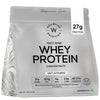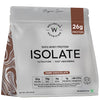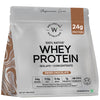Picture this: you walk into a nutrition store, greeted by a wide range of protein powders. Your eyes catch two familiar names—whey protein and casein protein. You’ve heard people rave about both, but you can’t help but wonder, “Which one should I choose?”
This is a common dilemma for fitness enthusiasts and anyone looking to boost their nutrition. Should you go for the fast-acting whey protein for quick recovery, or is the slow-digesting casein a better fit for steady nourishment? Each has its own benefits, and knowing how they work can help you make the right choice for your health goals. So, let’s explore the differences between casein and whey protein and find out which one might be best for you.
Whey Protein: The Quick-Release Wonder
Whey protein is derived from milk during the cheese-making process and is known for its fast absorption rate. This means when you consume whey, your body can quickly break it down and deliver a surge of amino acids into your bloodstream. For athletes and active individuals, this rapid influx is crucial after a workout, as it supports muscle repair and growth.
One of the key benefits of whey protein is its high concentration of branched-chain amino acids (BCAAs), particularly leucine. Leucine is a powerful player in stimulating muscle protein synthesis, which is essential for building and repairing muscle tissue. Studies show that this quick absorption can enhance recovery and help improve body composition by promoting muscle gain while reducing fat[NIH].
But the advantages of whey protein don’t stop at muscle recovery. It can also help curb hunger and support weight management. By incorporating whey into your diet, you may find it easier to maintain a lean physique, making it a favorite among those looking to optimize their health and fitness.
Casein Protein: The Steady Sustainer
On the other hand, casein protein makes up about 80% of the protein found in milk. What makes casein unique is its slow digestion rate. When consumed, it forms a small insoluble little ball or curd-like substance, in your stomach, leading to a gradual release of amino acids over several hours. This slow and steady absorption makes casein an excellent choice for times when you might go without food for a while, like overnight.
The benefits of casein protein are particularly significant for muscle recovery. Consuming casein before bed has been shown to reduce muscle breakdown during the night and enhance recovery [NIH]. This means that while you sleep, your body can steadily access the amino acids it needs to repair and build muscle, maximizing your gains even while you rest.
Moreover, casein is known for its ability to promote feelings of fullness. Because it digests slowly, it can help control appetite and prevent unnecessary snacking. This is particularly useful for those trying to manage their weight or adhere to a specific meal plan.
What's the difference between casein and whey?
Casein and whey are both high-quality proteins derived from milk, but they differ in how they are digested and utilized by the body. Casein makes up 80% of milk protein, while whey accounts for the remaining 20%. Both are complete proteins, meaning they contain all essential amino acids necessary for muscle repair and overall health.
The key difference lies in their digestion rates. Whey protein is rapidly absorbed, making it ideal for post-workout recovery and muscle building. In contrast, casein is digested slowly, providing a steady release of amino acids over time, which helps prevent muscle breakdown, especially overnight or during periods of fasting.
Incorporating both into your routine can optimize muscle growth and recovery—whey for quick protein replenishment after workouts and casein for sustained muscle nourishment throughout the day or before bed.
Whey Protein vs. Casein: Which Should You Choose?
So, the burning question remains: is casein better than whey? The answer ultimately depends on your individual goals and circumstances. If your primary focus is immediate post-workout recovery, whey protein is likely the superior choice. Its quick absorption and muscle-building properties make it essential in your fitness regimen.
Conversely, if you’re looking for a protein source to keep you satiated and support muscle recovery over a longer period, casein is a good option. Its gradual release of amino acids ensures your body is nourished throughout the day or during those extended periods without food.
Timing it Right
Consider a strategy that incorporates both types of protein. For example, using whey protein right after your workouts can help kickstart recovery, while casein protein before bedtime can provide your muscles with a steady supply of nutrients overnight. This balanced approach allows you to harness the benefits of both proteins, tailoring your nutrition to your specific needs.
Choosing the Best Protein Supplements
When it comes to selecting the best protein supplements, quality should always be your top priority. Whether you lean towards whey protein or casein protein, it’s essential to choose products that are crafted from high-quality ingredients. For whey protein, look for brands that source their protein from grass-fed cows, as this can enhance the nutritional profile, providing more beneficial fatty acids and better overall quality.
For casein protein, prioritize those made from high-quality milk sources without unnecessary additives or fillers. Ensure the protein content per serving is significant, along with a well-rounded amino acid profile to support muscle recovery and growth.
Additionally, pay attention to flavor and mixability. Choosing a protein that fits your taste preferences and blends well with your favorite recipes will make it easier to incorporate into your daily routine.
Lastly, consider your specific dietary needs and lifestyle. For those who may have lactose intolerance, excellent plant-based alternatives can deliver the same protein benefits without discomfort. Ultimately, the best protein supplement for you is one that aligns with your health goals, preferences, and dietary restrictions, allowing you to fuel your body effectively and enjoyably.
Conclusion
In summary, both whey protein and casein protein offer unique advantages that cater to different aspects of your fitness and nutritional needs. By understanding their differences, you can make informed choices that align with your goals.
Ultimately, whether you opt for the quick action of whey or the sustained support of casein, you have the power to enhance your health and performance. Embrace the strengths of both proteins and enjoy the diverse ways they can elevate your nutrition.
FAQs
1. Which protein is better for muscle growth: whey or casein?
Both whey and casein support muscle growth, but whey protein is more effective for stimulating muscle protein synthesis due to its fast absorption and high leucine content. It's ideal for post-workout recovery when muscles need a quick influx of amino acids. Casein, on the other hand, provides a slow and steady release of amino acids, making it beneficial for preventing muscle breakdown over long periods, such as overnight. For optimal muscle growth, a combination of both can be effective.
2. Which protein is better for weight loss: whey or casein?
Whey protein is often favored for weight loss due to its ability to boost metabolism and promote lean muscle mass. Its fast absorption can help control hunger, especially when consumed as a meal replacement or post-workout shake. Casein, however, is excellent for prolonged satiety, reducing overall calorie intake by keeping you full for longer. Depending on your weight-loss strategy, whey can help with metabolism and muscle retention, while casein can support appetite control.
3. When should I take whey protein vs. casein protein?
Whey protein is best consumed after workouts to enhance muscle recovery and growth. Its quick digestion allows for a rapid supply of amino acids when your muscles need it most. Casein is ideal before bed or during extended fasting periods, as it provides a sustained release of nutrients that help prevent muscle breakdown.
4. Can I take whey and casein protein together?
Yes! Using both whey and casein strategically can maximize benefits. Many athletes and fitness enthusiasts use whey post-workout for immediate muscle recovery and casein before bed to support overnight muscle repair. This combination ensures a continuous supply of essential amino acids throughout the day and night.































